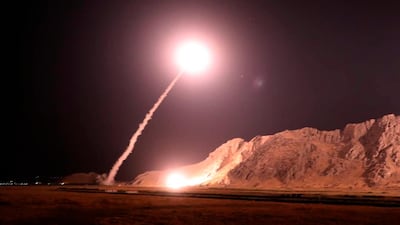Britain on Tuesday accused Iran of disregarding a UN resolution after the Security Council debated whether a purported ballistic missile test three days ago could even amount to a breach of Tehran’s nuclear deal with world powers.
The UK and France – which along with the US, China, Russia and Germany signed the milestone agreement with Iran in 2015 – put the matter before the Security Council, which gathered in a closed-doors meeting in New York.
The potential breach concerns UN resolution 2231, a provision agreed at the same time but not itself part of the nuclear deal, relating to Iran’s missile programme.
It requires Iran “not to undertake any activity related to ballistic missiles designed to be capable of delivering nuclear weapons, including launches using such ballistic missile technology” until 2024 at the earliest.
The provision’s true intent has often been contested because the diplomatic language – “Iran is called upon not to undertake” – was agreed to at the time of the nuclear deal. The wording does not explicitly forbid missile activity, effectively opening a loophole for test firing to continue should Tehran, which insists its missile programme is for defensive purposes only, so wish.
Speaking after the meeting, Karen Pierce, the British ambassador to the UN, said the December 1 missile test was inconsistent with the resolution and went “way beyond legitimate defensive needs”. She said that a lot of concern was expressed at the Security Council.
Asked by The National about the interpretation of the words chosen by diplomats three years ago, Ms Pierce added: "There is no legitimate reason why Iran should flout the resolution and why their spokesman should pretend that the resolution doesn't call on them not to develop such missiles."
Her comments follow those of US Secretary of State Mike Pompeo who cited the weekend incident as evidence that Iran contravened the deal by test firing a mid-range projectile capable of delivering nuclear weapons.
A foreign ministry spokesman in Tehran on Sunday refused to confirm if the missile test had taken place.
Nikki Haley, the outgoing US ambassador to the UN, insisted it had been conducted by Tehran “in defiance” of resolution 2231, describing the test as “dangerous and concerning, but not surprising”.
“The United States has repeatedly warned the world about Iran’s deliberate efforts to destabilise the Middle East and defy international norms. The international community cannot keep turning a blind eye every time Iran blatantly ignores Security Council resolutions,” she added.
Francois Delattre, the French ambassador to the UN, criticised Iran’s missile activity and described Tuesday’s meeting as useful but could not confirm if the issue would be debated further.
“We, as France, call on Iran to immediately cease any activity related to ballistic missiles designed to be able to carry nuclear weapons, including launches using ballistic missile technology,” he added.
British Foreign Secretary Jeremy Hunt called the test “provocative, threatening and inconsistent” with the UN resolution.
_______________
Read more:
Iran disinformation campaign reaches 15 countries and more than half a million people
Iran launches domestically made destroyer, state media says
Israel carries out airstrikes in Syria reportedly targeting Iranian militias
_______________
The raising of the potential deal breach by its European signatories comes as relations between Iran and the US hit a low ebb after the latter’s unilateral withdrawal from the agreement in May and its reimposition of sanctions on the Iranian economy.
Mr Trump’s administration reinstituted sanctions on Iran although the other countries in the nuclear deal – struck during Barack Obama’s second term in the White House – are sticking to it despite renewed US pressure on them to abandon the accord or face trade restrictions.
Also on Tuesday, the full text of an earlier letter sent to the Security Council by Britain, France and Germany was released in which the three countries said earlier Iranian missile tests were “inconsistent with” resolution 2231.
Dated November 20, the letter related to Zolfaqar and Qiam missiles launched on September 30 and October 1 on targets in the town of Hajin in Deir Ezzor governorate in Syria. Those launches came a week after an assault by militants on an Iranian military parade in the southern city of Ahvaz killed 25 people.
ISIS and ethnic Arab separatists both claimed responsibility for that incident and the Iranian strikes targeted areas where the militants are said to be sheltering.
The letter stated that while Britain, France and Germany took “note of Iran’s official position on these missile strikes as a response to a terrorist attack in Iran, we assess that Iran’s firing of the short range ballistic missiles was inconsistent” with resolution 2231.
“We respectfully request the Secretary General to submit a thorough report on Iran’s ballistic missile activity,” it said, noting that such weapons are capable of delivering “at least a 500-kilogram payload to a range of at least 300 kilometres” and were "inherently capable of carrying nuclear weapons”.
“Furthermore, this ballistic missile activity is destabilising and increases regional tensions,” it added.

